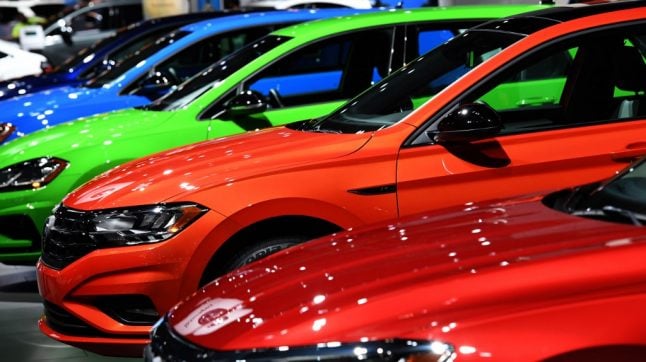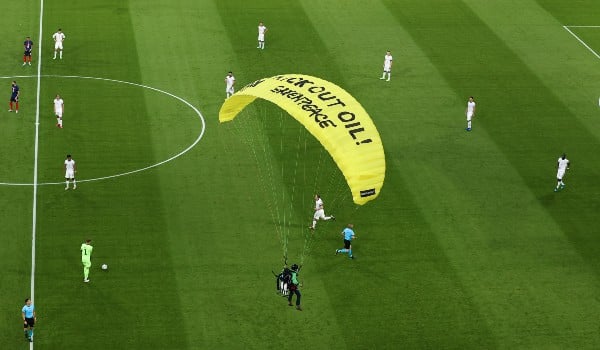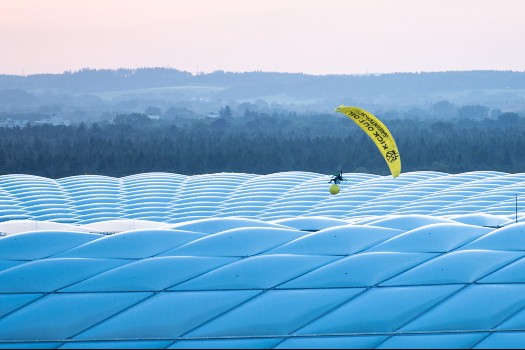BMW
EU accuses BMW, Daimler and VW of breaking antitrust rules
The European Union warned German car giants BMW, Daimler and Volkswagen on Friday that a preliminary inquiry has concluded they colluded to avoid competing on emission control technology.
Published: 6 April 2019 10:58 CEST

Volkswagen on display during the North American International Auto Show in January. Photo: TIMOTHY A. CLARY / AFP
Already reeling in the wake of the devastating “dieselgate” emissions cheating scandal that broke in 2015, the German carmakers will have to respond to the EU's findings, which could result in stiff penalties if the European Commission decides to pursue a cartel case against them.
A BMW statement said it would earmark a sum “which is likely to exceed one billion euros” ($1.12 billion) against potential fines, while adding that it “will contest the EU Commission's allegations with all legal means if necessary.”
Volkswagen's admission to manipulating 11 million vehicles worldwide to appear less polluting unleashed a wave of anger at the auto industry, and the Commission launched an in-depth cartel investigation into the three companies.
On Thursday the Commission said it has concluded that BMW, Daimler and the VW group — Volkswagen, Audi and Porsche — held so-called “circle of five” meetings to rig competition in emissions technology.
“As a result, European consumers may have been denied the opportunity to buy cars with the best available technology. The three manufacturers now have an opportunity to respond to our findings,” EU competition commissioner Margrethe Vestager said.
The meetings allowed them to limit the introduction of “AdBlue” or urea to diesel engine exhaust gases, reducing its effectiveness as a way to produce cleaner emissions, the statement said. The firms also — “in the Commission's preliminary view” — colluded to avoid or delay introducing filters that reduce harmful particles in petrol exhaust fumes.
The findings form the basis of a “statement of objections” to which the firms will have a chance to respond before the Commission decides whether to pursue a case under competition rules banning cartel agreements.
Hefty fines
If the Commission finds there is sufficient evidence of an infringement, “it can adopt a decision prohibiting the conduct and imposing a fine of up to 10 percent of a company's annual worldwide turnover.”
A VW spokesman confirmed to AFP that the German automaker had received the report and would “examine the complaints and issue a statement after evaluating the investigation file as part of its cooperation”.
BMW also said it would examine the “statement of objections”, adding that it “regards these proceedings as an attempt to equate permissible coordination of industry positions regarding the regulatory framework with unlawful cartel agreements”.
A spokeswoman from Daimler, which makes Mercedes-Benz cars, told AFP the firm was aware of the report but had already been cooperating with investigators and “does not expect to receive a fine in this matter”.
The Commission's statement said the investigation was “limited to an alleged violation of competition law” and is “not about possible breaches of environmental legislation”.
It emphasised the investigation was also separate from other continuing probes, including those “into car manufacturers and the use of illegal defeat devices to cheat regulatory testing” in the dieselgate scandal.
The Commission can impose heavy fine on companies that make agreements among themselves to the detriment of customers, while those that come forward and disclose cartels often get off without a fine.
Its biggest-ever fine of €2.93 billion was handed to Europe's top truckmakers — including Daimler — in 2016 for colluding over 14 years to fix prices and dodge the costs of stricter pollution rules.
By AFP's Clement Zampa with Yann Schreiber in Berlin
Url copied to clipboard!



 Please whitelist us to continue reading.
Please whitelist us to continue reading.